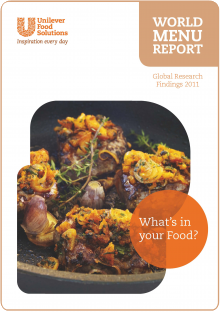Restaurants across the world need to be more transparent in
helping diners make informed meal decisions while eating out, a global survey
has found.
It’s not that consumers are not aware of healthier options
but they need that extra push to opt for foods that are nutritionally
beneficial, or at least not harmful. Poor levels of information were cited as a
significant barrier to leading a healthier lifestyle.
This can be achieved by the food services industry
providing more information about the foods they offer.
The biannual 2011 Unilever Food Solutions World
Menu Report, aimed at measuring people’s attitudes and behaviors towards
eating out, polled consumers in seven countries – the United States, United
Kingdom, China Germany, Russia, Brazil and Turkey.
The study, titled “What’s in Your Food?”, found that as
people become more health conscious there is a rise in concern regarding the
nutritional values of the food they eat.
“Eating habits have changed dramatically and rapidly over
the past few decades, largely as a result of more choices, larger portions and
increased access to fast foods,” says the survey.
Though the report does not mention obesity, it is an issue
of growing concern today with the easy availability of fast food and
convenience foods.
Obesity has reached epidemic proportions globally with at
least 2.8 million people dying each year as a result of being either overweight
or obese, according to the World
Health Organisation.
Being overweight or obese raises the risks of coronary
heart disease, ischaemic stroke, type 2 diabetes mellitus and some common
cancers.
Between 1980 and 2008, obesity has doubled worldwide. By
2008, 10 per cent of men and 14 per cent of women (half a billion people) in
the world were obese, compared with 5 per cent of men and 8 per cent of women
in 1980.
The World Menu Report found that people are demanding the
right to enjoy food that is healthy but still delicious.
Those polled mostly wanted to know about fat, calorie
content, additives and preservatives. Also, in the West people wanted to know
more about salt content while in China people demanded more information about
the vitamins and proteins in their food.
Key findings of the report:
- In all countries, there is a need for more information – 9 out of 10 people demand truth about food when eating out
- Nutritional information could help people make healthier choices
- Food labels including low fat and calorie content would be welcome
Gaby Vreeken, President Marketing, Unilever Food Solutions,
says: “We believe that all of us in the food service industry have a responsibility
to tackle the global obesity crisis.
“The insights from this major new study show that the
challenges of encouraging healthier diets can be addressed with small changes
to existing menus.
“In essence, it’s no more than a nudge to help guests choose
a healthier option. Small steps can have an enormous impact on the health of
diners across the world and help to tackle rising obesity levels.”

No comments:
Post a Comment